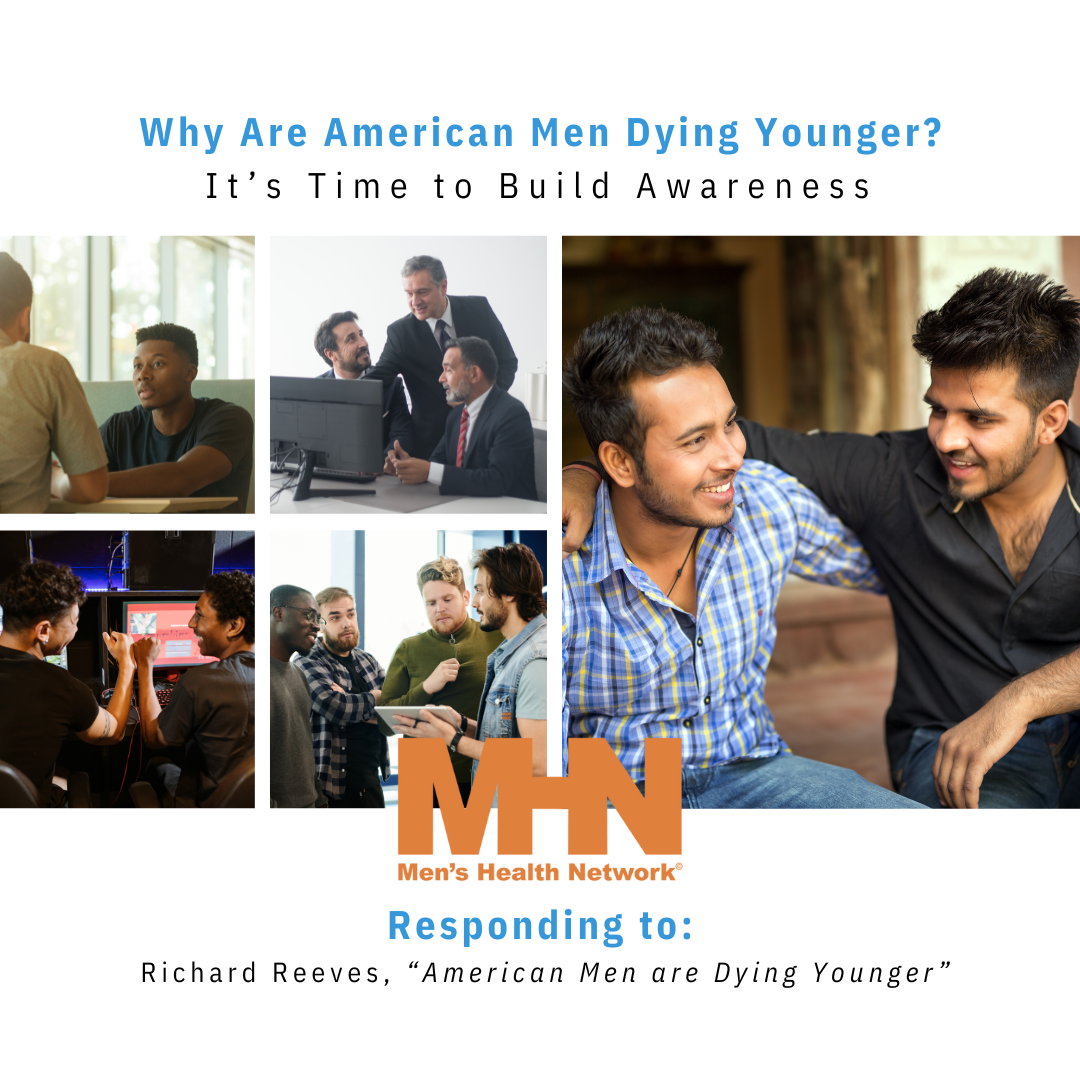Why Are American Men Dying Younger?
It’s Time to Build Awareness
Richard V. Reeves’s recent article, “American Men Are Dying Younger”, brings to light a deeply concerning issue in the United States: the declining life expectancy of American men. This is more than a public health problem—it is a crisis that impacts families, communities, and workplaces across the country. Men’s Health Network (MHN) is dedicated to addressing these challenges, offering solutions to help men live longer and healthier lives, and supporting the families and communities that rely on them.
A Troubling Reality
Reeves highlights the stark truth: American men are living shorter lives than men in comparable countries. Preventable deaths—such as those caused by suicide, drug overdoses, and alcohol-related illnesses—are at the core of this decline. These “deaths of despair” often leave families and communities in turmoil, underscoring the urgent need for intervention.
In addition to these preventable causes, men face significant health disparities due to delayed medical care, limited preventative screenings, and barriers to accessing resources that address their unique health needs. These issues ripple outward, affecting their roles as fathers, sons, brothers, and community members.
Understanding the Causes
One major contributor to this trend, as Reeves discusses, is economic instability. As traditional male-dominated industries decline, many men face job losses and wage stagnation, leading to feelings of frustration, hopelessness, and stress. These challenges often manifest in poor mental and physical health, further fueling a cycle of despair.
Another key factor is the cultural expectation for men to remain stoic and self-reliant. This discourages them from seeking help for mental health concerns or addressing physical ailments until problems become severe. The resulting lack of preventative care often leads to higher rates of chronic illness and premature death.
Healthcare Gaps
The article also points to systemic issues in healthcare access and engagement. Men are less likely than women to visit doctors for routine checkups or screenings. This reluctance often stems from misconceptions about their health, fear of diagnosis, or logistical challenges in scheduling and attending appointments.
Moreover, health campaigns and resources often fail to resonate with men or address their specific concerns. When health services overlook the unique challenges that men face, families ultimately bear the burden of caring for loved ones who may have otherwise avoided preventable health crises.
The Role of Family
Families are at the heart of the men’s health conversation. When men neglect their health, the effects ripple through their relationships, responsibilities, and communities. Fathers who are present and healthy provide emotional and financial stability to their children, support to their partners, and contribute to the overall well-being of their households. Ensuring men have access to the resources they need to stay healthy is a critical step in strengthening families and the communities in which they live.
Solutions Rooted in Action
Reeves argues that addressing these challenges requires a proactive, family-centered approach. Public health campaigns must be designed to meet men where they are—at work, on the sports field, and in places of worship. By focusing on their roles as providers and caretakers, these campaigns can encourage men to take responsibility for their health in ways that align with their daily lives and values.
Men’s Health Network takes this approach seriously, providing resources and educational campaigns tailored to men. For example, our Men’s Health Month and Wear Blue Day initiatives highlight the importance of preventative care, early detection, and fostering health conversations within families. These campaigns are designed not only to reach men but to engage the family members who often influence their health decisions.
Reaching Men Where They Live, Work, Play, and Pray
At Men’s Health Network, we emphasize the importance of meeting men in the environments where they feel most comfortable. Whether through community health fairs, partnerships with workplaces, or collaborations with faith-based organizations, we strive to bring health resources and education to men in familiar and supportive settings.
Workplaces are an especially effective avenue for engagement. Employers can play a key role in encouraging men to prioritize their health by offering wellness programs, on-site screenings, and incentives for preventative care. Similarly, faith-based organizations can provide a trusted environment for health education and outreach, emphasizing the spiritual and familial responsibility to maintain one’s health.
A Call to Action
Reeves’s article serves as a wake-up call. The declining life expectancy of American men is not just a crisis for individuals—it is a crisis for families. When men suffer, so do their loved ones. By taking action to address the root causes of this decline, we can support men in becoming healthier, more present members of their families and communities.
Through awareness campaigns, improved access to care, and a focus on preventative health, we can change this trajectory. Families, employers, and community leaders all have a role to play in ensuring that men receive the support and resources they need to thrive.
Men’s Health Network is committed to this mission, and we invite you to join us in the fight to improve the lives of men and boys across the country. Together, we can build a healthier future for men, their families, and the communities that depend on them.




